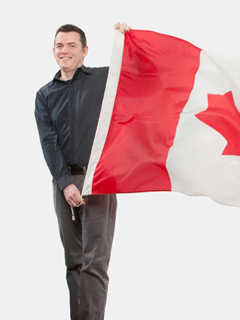Few, if any, people know more about Canada Day than U of G professor Matthew Hayday.
The history professor has written numerous research papers, articles, book chapters and columns on the topic. He has spoken about the July 1 celebration in talks across the country, and co-edited a book about Canada’s national days and holidays titled Celebrating Canada. He was even asked to write the definition of Canada Day for the online Canadian Encyclopedia.
The national holiday has been a fascination of Hayday’s ever since he moved from Toronto to Ottawa in 1998 to complete his master’s and then his PhD.

“I found my first experience of Canada Day in Ottawa jaw-dropping,” said Hayday. “There weren’t just the fireworks that I was used to growing up in Toronto. People flooded the downtown, painted their faces and were wearing maple leaf flags as capes. I was so intrigued by the way Canada Day was exuberantly celebrated here.”
Not long after that, Hayday turned his research focus toward July 1 and its history. He is interested in how the national holiday is used by the federal government to foster messages about Canadian identity and to garner public support for various policies.
“The federal government uses these celebrations to send subtle messages to the people of Canada,” said Hayday. “It looks like a big party on the surface, but the government and other actors and organizations are also using this time when people are focused on Canada to try to get them to think in certain ways so they will come to support certain positions. This holiday is important as it provides a window into what type of future our government officials and politicians envision for the country and how they conceive the past.”
This year’s message includes a focus on reconciliation with Indigenous people, and it’s a message that has brought about controversy, he adds. Hayday discusses the reasons in a recent article published by The Conversation Canada.
“This is nothing new. Contestation has always been present as part of Canada Day. It would be surprising if there wasn’t active debate about Canada’s past, or the path forward from here. I think it’s good that this holiday can be used as a vehicle to raise concerns and put pressure on politicians.”
The July 1 celebration has changed since its beginnings just after Confederation. It was made an official holiday in 1879.
“It wasn’t until the 1950s and the John Diefenbaker government that we saw the federal government focus on celebrating our nation’s birth. Diefenbaker was worried that we were becoming too American, and he wanted more of a focus on our British roots, so he started government-sponsored celebrations of Dominion Day.”
The holiday’s name was officially changed to Canada Day in 1982, the same year the Constitution was repatriated.
This year, as Canada turns 150, we likely won’t see quite the same nationwide enthusiasm that marked the country’s centennial in 1967, says Hayday.
“There’s a different mood about Canada’s history now compared to then that has made Canadians realize the fractured lines in the country, and the many problems in its past and present.”
Despite that, Hayday has big Canada Day plans. Instead of hosting his annual backyard barbecue in Guelph, he will be one of more than 500,000 people expected to venture to Ottawa’s Parliament Hill on July 1.
“Although it’s unlikely I will don a maple leaf cape, I will enjoy a celebratory pint or two.”
Contact:
Prof. Matthew Hayday
mhayday@uoguelph.ca